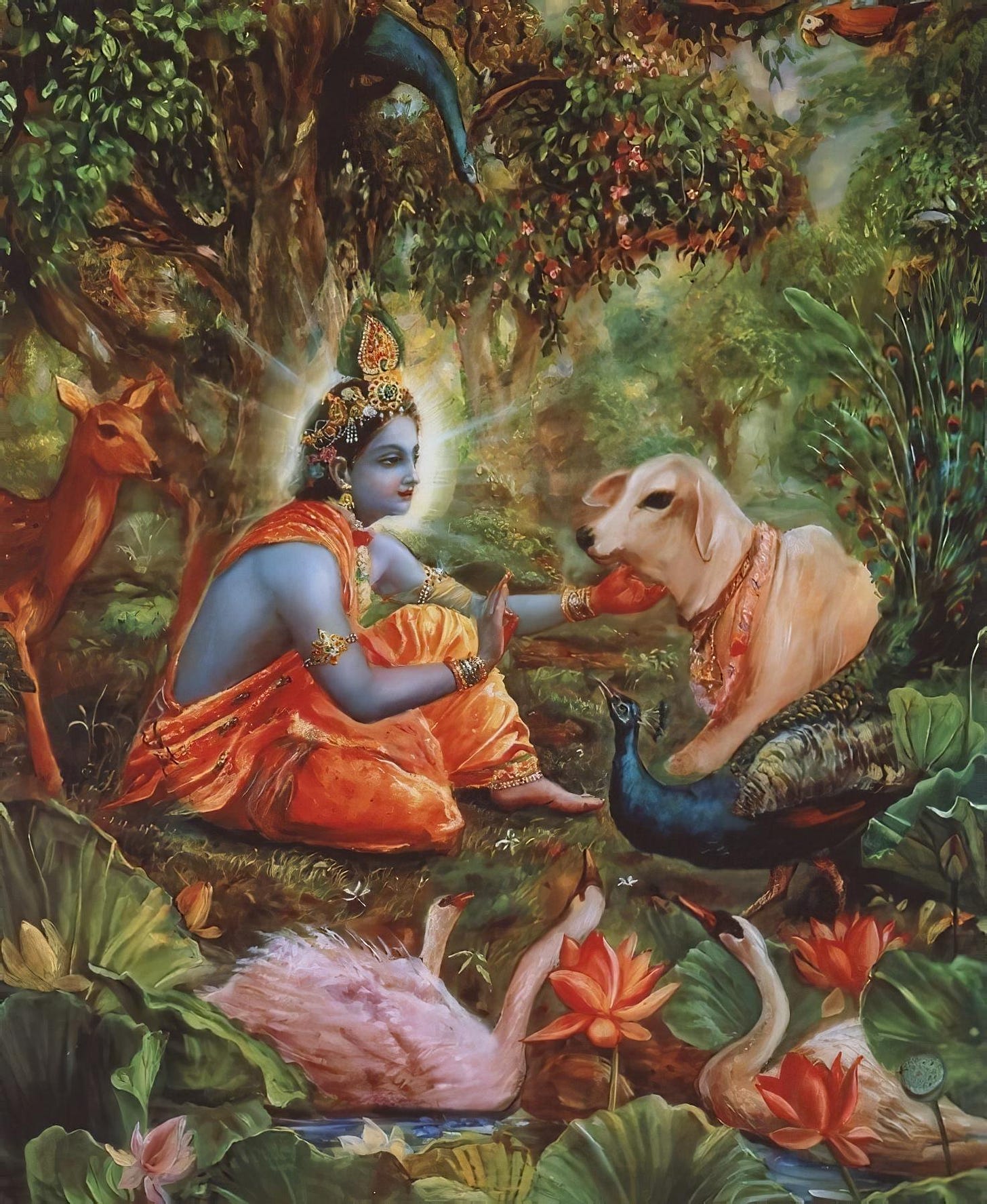Being nice, like Krsna
We can always meditate that if Krsna, who is God, acts in such a meek and charming way with everyone, what excuses do we have to not do the same?
Here is a part of a purport from Srila Prabhupada that really caught my attention:
"Lord Kṛṣṇa’s gentle behavior before His so-called superiors such as His father, grandfather and elder brother, His amiable behavior with His so-called wives, friends and contemporaries, His behavior as a child before His mother Yaśodā, and His naughty dealings with His young girlfriends cannot bewilder a pure devotee like Uddhava."
The part that struck me is how Krsna deals nicely with his superiors, as well as his friends. He is a little naughty with mother Yaśodā, of course, but this is just part of the vātsalya-līlā, since a child being a little naught is a source of joy for the parents. In all other pastimes, as when he deals with the Pandavas, with the senior Yadus, with his fathers Vasudeva and Nanda Maharaja, his wives in Dvārakā, and even His servants, Krsna always shows the highest degree of politeness.
Although Krsna is God and therefore all-powerful, He doesn't take offense easily. Śiśupāla had to offend Krsna one hundred times before He decided to take action, and even so, Krsna cut his head more out of concern that some of the Kṣatriyas in the assembly would start a fight and spoil the sacrifice of Maharaja Yudhiṣṭhira. Personally, Krsna was not disturbed by the speech of Śiśupāla, just as a lion is not disturbed by the howl of a jackal.
Krsna is also extremely considerate in dealing with His friends. Although He is God, He agreed to become the charioteer of Arjuna just to help him in the battle of Kurukṣetra. Krsna had promised not to fight, but still, He found a way to protect His friend by becoming his charioteer and thus keeping him out of danger by expertly moving his chariot.
When Sudhāmā Vipra visited Krsna's palace, He immediately recognized him and treated Him like the most respectable guest, even though Sudhāmā was just a poor Brāhmana and they had not seen each other for a very long time. Although Sudhāmā did not ask for anything, Krsna gave Him all opulence in exchange for just a morsel of broken rice that Sudhāmā brought with him. This shows how Krsna is generous.
Krsna is also an extremely caring and affectionate husband. He takes extremely good care of all His wives and never raises His voice or chastises them. He takes very good care of all affairs and treats His servants like His own children. He is a "Vedic husband" in the real sense of the term.
This contrasts with the way we often behave, being harsh and close-minded with others, treating others with prejudice, failing to offer respect to our superiors, mistreating our spouses, neglecting our children, and so on. Srila Prabhupada explains that as souls, we are qualitatively one with Krsna; therefore, all these good qualities are also present inside of us to some degree. However, under the covering of the material modes, such divine qualities manifest in a perverted way as lust, anger, ignorance, and so on. As we practice the spiritual process and gradually become cleansed of the influence of the lower modes of nature, these negative qualities gradually fade, showing our real, divine nature.
In His different pastimes, Krsna gives us the best example. We can always meditate that if Krsna, who is God, acts in such a meek and charming way with everyone, what excuses do we have to not do the same? If we could meditate more on this humble conduct of Krsna and try to follow His example in our day-to-day life, our communities and our society at large would undoubtedly be very different.
Read also:
Krsna attracts everyone
Srila Prabhupada explains that the Vedas are like a desire tree that contains all types of knowledge. Because most people are interested only in the four materialistic religious principles of dharma, artha, kama, and moksa (mundane religiosity, economic development, material sense gratification, and impersonal liberation), the Vedas explain a lot about how to achieve these in the karma-kanda sections. For people who are spiritually inclined, there are the jñana-kanda sections, which deal with spiritual knowledge, such as the Upanisads and the Vedanta-sutra, but the Srimad Bhagavatam brings the highest knowledge, directly describing the Supreme Personality of Godhead. The Srimad Bhagavatam is considered thus the essence or the ripened fruit of all Vedic literature.
If you read this article to the end, give it a like. This makes Substack recommend it to more people.




Perfect timing and so clearly explained as always ❤️ Thank you Sir 🙏🏼
Maybe krishna wanted to increase and relish his sweetness even more by letting me read this write up by his loving mercy 😊 thanks for sharing!
Hare krishna